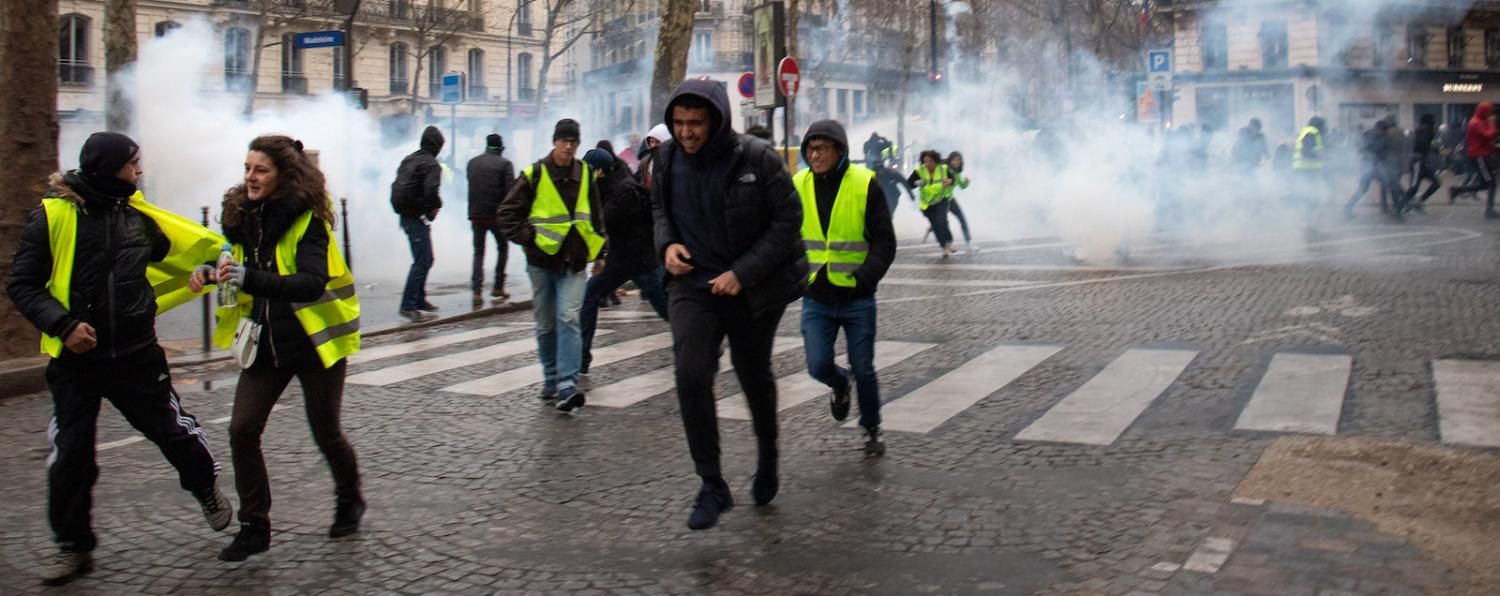“Wutbuerger”, like “Zeitgeist” and other Germanic expressions, has become a keyword in all European languages: angry citizens, steamrolled by rapid change, often belonging to the working poor in mostly rural areas, easy seducible by political snake oil vendors and their nationalist, anti-immigrant, and anti-European rants. The Gilets Jaunes (Yellow Vests) in France are the latest example, representing a good 20% of the country’s population.
Macron made one big mistake in his reformist policies by lowering taxes for the rich while putting an extra levy, climate-related, on petrol.
The vote for Brexit in the UK, the vote for Trump in the US, the 12.5% of votes for the AfD (Alternative für Deutschland) in Germany, and now the French Wutbuerger, blocking infrastructure, burning cars, and pillaging shops all have something in common. At their core sit the direct losers of globalisation, those who have lost jobs and are the direct victims of growing inequality. On the periphery are those angry at seeing their income stagnate for the past decade while the one-percent got away scot-free after the financial crisis.
Meanwhile, there are those who profited: from the massive monetary expansion by the public sector to fight the ensuing economic crisis and the billions which flowed and continue to flow mostly into income from capital, not labour.
Whatever one may think of Frenchman Thomas Piketty’s Capital in the Twenty-First Century (ennobled by the FT Economic Book of the Year Prize in 2014), his main thesis, the tendency of returns on capital to exceed the rate of economic growth, is statistically unassailable.
Add to that the ease of mass mobilisation through social media, the hunger for news by 24-hour newscasters, and the partisan, mostly rightwing bias of tabloids in print and visual media such as Fox and Sky, as well as the incapability of tech companies to prevent fake news – and you have a perfect storm in seemingly solid democracies.
The Trumpian storm that threatens to wreak havoc with the oldest Republic and the spread of global values it stood for until Obama left the White House. The new, this time successful Guy Fawkes bomb, called Brexit, menacing to destroy British welfare, the cohesion of the country, and its rightful place in Europe. Teutonic rightwing furore by the AfD and its trivialisation of the darkest national period on historical record which has triggered a veritable governmental crisis in Germany.
And now the hurricane has reached another pillar of Europe, France which had appeared to be on the economic mend thanks to reforms by President Emmanuel Macron. Further complicating the matter is the exodus of London’s financial services to Paris – those not willing to give up the bright lights of a true capital for the provincial chic of Amsterdam, Dublin, and Luxembourg, or concrete-cold comfort in Frankfurt.
The Paris-Berlin axis powering the EU is now more necessary than ever and is mostly kept in motion by Macron’s many initiatives to make Europe more efficient. A weakened Macron and German Chancellor Angela Merkel are fighting to make Europe a real power on a global table that is increasingly tilted towards the Asia-Pacific.
Of course, each of these national storms have specifically national origins. The Yellow Vests are no exception. The French Fifth Republic, historically cut to measure for the larger than life figure of De Gaulle, gives inordinate power and prestige to its President. This applies also in the reverse: when things go wrong, he is blamed for everything, by everybody.
And Macron made one big mistake in his reformist policies by lowering taxes for the rich while putting an extra levy, climate-related, on petrol. This was bound to make low-income earners furious who didn’t profit from the cuts but paid more for their daily way to work.
Also, after ten years of, jerky (President Sarkozy) and phlegmatic (President Hollande), immobilism, the French are not used to a president who wants to somewhat reduce the presence of the state into all French affairs.
All this helps to explain the inordinate hatred coming from seemingly ordinary citizens, such as, this quote by an apparently un-lunatic French citizen: “I will personally intrude into the Élysée (the French White House) to kill this piece of garbage” (translated by the author from a statement in French on the 24 hours news station BFM-TV).
In a much anticipated first statement since the outbreak of the riots, Macron mixed signals of toughness regarding street violence with words of contrition about his tone-deafness to social ills. His general promises for policy changes were interspersed with the announcement of specific relief for the poorer parts of the population. Basically, a statesman-like speech of a sort other Western democracies can only dream of at this time in their national history.
However, now that the walls are broken, the Yellow Vests already signalled that they want more, much more.
That won’t be possible as Macron’s considerable financial concessions already endanger short-time budgetary aims. And they are at the core of his intention to make an economically prosperous and fiscally responsible France the present pillar of a strong Europe, a global champion of values and common sense, such as reasonable climate policies, in an increasingly fraught world.
If France does indeed descend into uncertainty or even chaos, things look bleak for the EU, at a time when the two other main European powers are engaged in fighting their own internal and inner demons.
